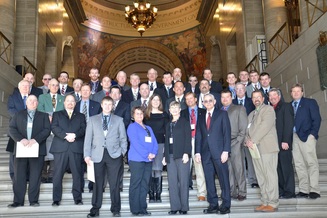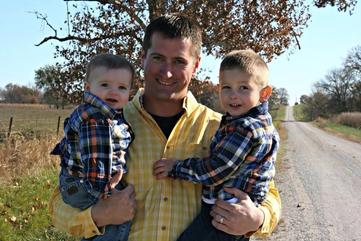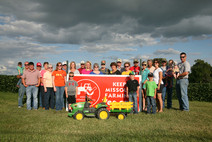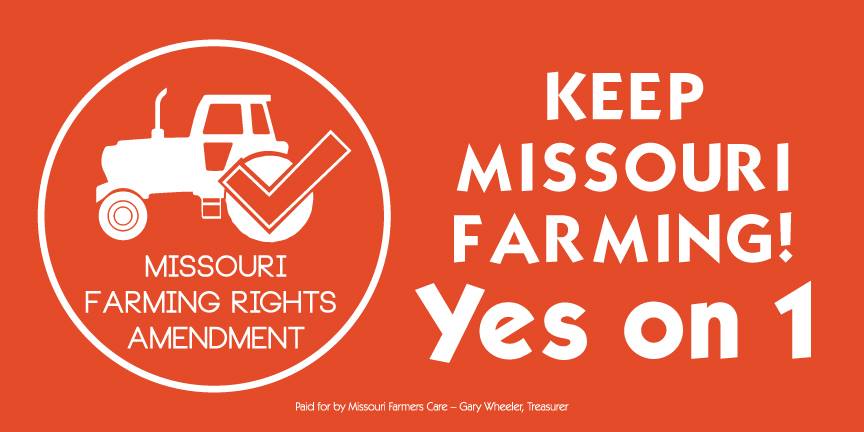Uptown Girl
Christian. BoyMom. Farmer's Wife. Marathon Runner. Ag Professional. Bourbon Lover.
Advocate for all things agriculture and rural.
Advocate for all things agriculture and rural.
|
D ear Neighbor,
You pass by our local business daily, even though we don’t have a storefront on Main Street. You drive by our production lines to and from work each day, although you probably just call them fields. You probably don’t give much thought at all to the corn, cattle and soybeans we are raising. It would probably surprise you to know, that right here in Linn County, MO, a recent economic impact study concluded that $126.6 million in sales is created each year by the local farm families and that 1,173 jobs are supported by those sales. For a rural county, with total population just over 12,000, those numbers are rather significant. On a national level, the US Grain Council highlights that agriculture accounts for 20% of the US economy and creates more manufacturing jobs than any other sector. In total, more than 21 million jobs are supported by agriculture. Even with those numbers, we are often left out of the conversations around our economy and local growth and business. That’s on us more than you – we don’t always make ourselves as available as we should. We often struggle to get away from the farm to tell our own stories and sometimes we get aggravated with those who don’t understand our livelihood. Right now though, we need you to know something. We need you to know that we need NAFTA. Last fall, I was at the high school football game, where a neighbor was complaining about “grocery store beef”. Like so many others, he seemed surprised when I explained that our beef IS that grocery store beef. Our family is dependent on a much larger market than our local market. Like most farming communities around the county, we raise more product than could ever be consumed locally, even with the trendiness of it all. Farms tend to be where people are not. As of 2012 census, we had over 46,000 head of cattle in our county. That’s nearly 4 times our human population. The local crew could never consume all that beef. The same holds true for the corn and soybeans and other products we raise. Your local farm families – your American farm families – happen to be extremely good at what they do. The best in the world by most measures. NAFTA - the North American Free Trade Agreement, makes trade with some of our largest partners - Canada and Mexico - more efficient. And trade is vital to the success of American agriculture. US Grains Council points out that the sale of corn to Mexico has went up 847% since the start of NAFTA. Missouri is uniquely at risk. In 2016 alone, 69% of our ag exports went to NAFTA trade partners which makes us the 5th highest state for percentage of exports effected by the agreement. The US Chamber of Commerce estimates that 8.2% of Missouri job are connected to NAFTA trade. Your local farm families are entering our fourth year of an agriculture downturn. The USDA reports that farm income has decreased 42% over the last three years. Many of your local farmers are not in a financial position to withstand the economic blow that would be delivered from a withdrawal. Young farm families like my own would be hit the hardest. We love the communities we call home, and we are passionate about helping rural communities thrive. In order for our local business to continue to have strong impact on our rural economies, we need you to know that #NAFTAworks. And we need you to share your support with our elected officials. Love, Your Local Farm Family
202 Comments
7/21/2015 4 Comments He is not "just a farmer" MO Corn Growers meet with lawmakers at the state capital. Photo courtesy of Missouri Corn Growers. MO Corn Growers meet with lawmakers at the state capital. Photo courtesy of Missouri Corn Growers. The boys and I made the trip back home to northern Illinois over the weekend, without my husband who was in the fields still, and someone asked, “Does your husband just farm?”. I understood the question. The person asking was wondering if that was his full time job or if he had another job. And the person asking was certainly not meaning any offense by the question. But it had me thinking for many of the miles home. My husband, like any farmer, is not “just” a farmer. He is a well-educated, smart man. And this is not unique to my husband. Most all the successful farmers I know are ridiculously smart. In no way are these people “just” farmers. So here is a list of just some of the roles farmers play every day. Farmers are….. ·Laborers: Much of their day is spent doing physical labor. Before I sat down at my desk this morning my husband had physically hauled feed to several hundred animals and picked about 30 dozen ears of sweet corn. A few months ago we participated in a Fitbit challenge and I was blown away when my husband consistently out-stepped me (the runner!). One day I had an EIGHTEEN mile run. I got up at 4am and purposely ran around town in circles for 18 miles. He out-stepped me that day (they were building fence) by 100 steps. I cried. ·Scientists: They are constantly gathering and analyzing data, testing soils and plants, analyzing those tests to make informed decisions about what the next move will be. This year for instance, my husband has had to monitor the rain fall on each of his fields to try and gage how the nutrient content, soil health and plants will be affected from the large amounts of moisture we have had and determine if there is anything they can do to help their plants. If you doubt the intelligence of a farmer, check out this guide from North Carolina Department of Ag that is supposed to help a person read a soil test. ·Weathermen: The farmer does not rely on the local news channel for his forecast. Instead, he gets out his smart phone and looks at a dozen different websites, analyzes the radar maps, and makes his best determinations about when to plant, when to mow hay, and when to hold off. These decisions can be the difference between making a profit or not. People married to farmers do not check the weather either – we simply call our farmer (who is probably more accurate)! ·Chemists: Many farmers have their chemical applicators licenses and are required to study and understand the chemicals they are using. Watching my husband prepare his sprayer is like watching a chemist at work in a lab. He is intimately familiar with the chemicals he is using, their purpose, risks and hazards, and the exact measurements and mixtures he needs to be safe and effective! ·Veterinarians: Livestock farmers simply cannot rely on their local veterinarian all the time. They have to know about medications, dosages, and wound care. It’s not uncommon during calving or lambing season for my husband to have to deliver babies, treat mamma for something and treat babies for something in the middle of the night when no one else is available. ·Buyers: The options available to farmers for seed, chemical, fertilizers, loan products, equipment and more are endless. They have to spend time sorting through all of the data and reviews to make the best decisions for their operations. Unlike popular internet myth, Monsanto does not make a single one of these decisions for the farmer and Monsanto is only one of many choices they have. ·Marketers: Farmers have to market their own grain, hopefully at the right times. They have to make the final determination about what to sell and when. Again, these decisions can mean the difference between being able to make the farm payment or not. ·Lobbyists: Farmers now make up less than 1% of the population. This means each year politicians care less and less about how their legislation affects farmers. Several times a year my husband puts on his suit and tie and heads to our state capital to meet with lawmakers and tell his side of the story. ·Heavy Equipment Operators: So this is probably a given. Most people think of farmers driving their HUGE tractors in the fields. But farmers also have to navigate those giant pieces of equipment down city streets and highways, safely! This is a huge challenge for them during planting and harvest and one of the most stressful things about their job. So always remember to SLOW DOWN when you see farm equipment on the road! ·Mechanics: Farm equipment breaks down. It breaks down in fields that are miles and miles from anywhere. And most farmers can fix most anything and have to, often times in a hurry. ·Men of God: They know there is only a portion of their job they can control and huge portion they cannot. They cannot control the weather, disease, pests, prices and more. So they look up and ask the Good Lord to give them the tools they need to make it another year doing what they love. Whatever farmers do they always do it well! 3/7/2015 33 Comments Five reasons to feel GOOD (maybe even PROUD) about buying conventionally grown food! This is the guy growing GMOs that they are trying to scare you about. He graduated with two degrees in animal science and plant science, goes to church (although not as often as he should) and is seriously devoted to growing safe food and taking care of his farms. This is the guy growing GMOs that they are trying to scare you about. He graduated with two degrees in animal science and plant science, goes to church (although not as often as he should) and is seriously devoted to growing safe food and taking care of his farms. I asked several of my non-farming friends what their main concerns are when grocery shopping. Most of them rattled off a few things about health and safety and then nearly all of them, almost quietly, mentioned cost. I am here to tell you it’s a GOOD thing to be considerate of cost at the grocery store and I am going to tell you why you can feel good about, or dare I say PROUD, about buying conventionally grown products! 1. Conventionally grown is equally as nutritious and safe as its organic counterparts!! All foods are rigorously tested for food safety in the USA which is why in the rare case when someone does get sick from food, it still makes headlines. In many countries, a person getting sick from food is not even considered news worthy! Hundreds of tests have been done and there are no nutritional differences in the two. Organic is a method of producing food, not a label that indicates anything about the safety or nutrition of the product. (Review one of the studies completed for nutritional differences here: http://www.ilsi.org/FoodBioTech/Publications/10_ILSI2008_CaseStudies_CRFSFS.pdf) Most all produce can be found with extreme trace amounts of pesticide (yes organic production does allow for the use of over 50 pesticides). There is no notable differences in these trace amounts from organic and conventionally grown making both options SAFE options! 2. Being financially smart is GOOD and IMPORTANT for your family! I would guess most families are just like mine – living on a budget that most often is pretty tight. When you refuse to pay twice the price for a gallon of milk labeled “antibiotic free” because you know ALL dairy and meat are antibiotic free at the time of consumption, you are telling your family that their financial security is important to you! I am giving you permission to be financially smart –without guilt – about your buying decisions at the grocery store! Moms especially tend to stress about doing the absolute best for their children. Don't let this be one of the things that adds stress -- because fresh food is always a good choice regardless of how it was produced! 3. You are supporting family farmers, whose livelihood depends on their farms! People have a tendency to confuse the “organic” label with “local”, “small” or “family”. Yes, a lot of organic is produced that way (some is not). But guess what – nearly all conventionally grown foods are also grown BY FAMILY FARMERS!! My husband raises conventional grown (yes that means GMO) corn, soybeans, alfalfa hay and of course cattle and sheep. We also eat what we consume. We also feed it to our livestock and children. When you purchase products that are conventionally grown you are not supporting some scary “agribusiness giant” – you are supporting him. And hundreds of farmers just like him. A majority of which are also small farmers like our family. 4. You are supporting technology that allows a safe, affordable food source worldwide! GMO technology is the most thoroughly tested product on the market today. In fact, there are over 2000 independent and peer reviewed studies that show the safeness of GMOs for both human and livestock consumption! (See a discussion on those studies here: http://geneticliteracyproject.org/2013/10/08/with-2000-global-studies-confirming-safety-gm-foods-among-most-analyzed-subject-in-science/) When you say “Yes!” to conventionally grown products you are supporting further development of this technology that has allowed us to produce more food on fewer resources than ever before! GMO technology allows us to better care for our land and water. GMO technology allows us to use less chemical and to better negate the risks involved in farming such as drought, flood, pests and disease. GMO technology is keeping food at affordable prices. 5. You are teaching your children to base decisions on logic and fact, not fads and marketing. Many labels were developed as a means of fetching a premium for a product. Many of these practices have higher costs and higher waste, so marketing the product for a premium is vital to the industry. This marketing is often done by ill means – misleading information, scare tactics and food guilt targeted at food produced by other, more modern means. Organics is a $35 billion dollar per year business – so do not be fooled. It is a business – one that is not anymore concerned about your wellbeing and health than any other business is. Trust in fact and science to take comfort in your purchase decisions. Trillions of meals containing GMOs have been consumed and not one case causing human harm has been found. The World Health Organization, AMA, FDA, European Commission, National Research Center and even the Bill and Melinda Gates Foundation all support the safety of GMOs. (Someone will argue that some other countries do not allow GMOs, which is true. The reason however has nothing to do with science, evidence or any ill effects of GMOs. It is simply because their governments caved to public pressure when the public was scared by the same tactics being used here now). Not all of us have the luxury of being able to spend limitless dollars on food. Not of all of us think it’s necessary even if we did have the money. Many of us know that it’s OK, even something we can feel good about, to feed our families with scientifically proven products, that are safe and nutritious and grown by family farmers! So say no to #FoodGuilt and yes to #FoodFacts! For more information about all types of farming, please visit some of the following links: CommonGround http://findourcommonground.com/ GMO Answers http://gmoanswers.com/explore Genetic Literacy Project http://geneticliteracyproject.org/ Missouri Farmers Care http://mofarmerscare.com/ For information regarding the requirements of organic production please visit here: http://www.epa.gov/agriculture/torg.html  Linn County, MO Family Farmers Linn County, MO Family Farmers Amendment 1 will not protect farmers. You are right Mr Oswald. Amendment 1 will not protect family farmers from corporate farmers (although you haven't convinced me why exactly I need protection from them.) It will also not protect organic farmers from traditional farmers. It will not protect large farmers from small farmers. Amendment 1 will not protect farmers from drought. Or floods. Or hail. Or bad prices. Amendment 1 will be hard to enforce with the deer population consuming half our bean crop, even if it's easy to see how they are infringing on my right to farm. Amendment 1 will not protect from your neighbors cows trampling your beans. And it will not protect from cold or wind or hot. There is a whole list of things amendment 1 will not do. Mr. Oswald, in response to your article in Missouri Farmer Today, I would like to suggest that if you are looking for blanket protection from all of the risks we face in this business, you may have chosen the wrong business. You see Mr. Oswald, Amendment 1 wasn't designed to protect from these things. It wasn't designed to wage a war between corporate and family farms, or large and small farms. Amendment 1 was written to protect against a threat you chose to not even address. A threat that is far greater than any of those you tried to scare us with. A threat that will be the biggest challenge agriculture has ever faced. A threat that we will continue to under-estimate for years more, until it's too late. I assume the reason you did not address this threat is because your biggest donor, HSUS, is the main perpetrator of it. Amendment 1 is designed to protect all farmers from unjust, unnecessary and costly legislation. Something HSUS spends over half it's 150 million dollar budget on trying to pass. (I must give credit to the group for the 0.43% of the budget that helped cats and dogs.) Amendment 1 was written to stop politicians from telling me what seeds to plant, what times I can harvest, who can provide health care to my livestock. It is written to keep the animal extremists, like your donors, from telling us how to do our jobs. This threat is very, very real in other states. They get it. They wish they would have passed right to farm before it was too late for them. And this threat will become very real here if we do not stop it on August 5. If your neighbor sprays your crops, or the commercial farmer wants to take your land, he will have to take it to the courts. (And any simple legal analysis would tell you that his right to farm could not, under any circumstances, trump your right to farm simply because he is larger). The neighbor who sprays your crops will still be liable for it (just like he is now). The corporation wanting to take your land will not be able to do so (just like they can't now). I would encourage you to start having a conversation about the real issue Mr. Oswald. I would encourage you to stop using scare tactics to encourage a fight among neighbors. We are all in this together. We all suffer when it's dry, we all suffer when it's too wet. And we will all suffer if we do not tell out of state interest groups to stay out of our farming policy. Vote YES on amendment 1. (Written in response to an article that was published in the Missouri Farmer Today by Missouri Farmers Union President, Richard Oswald.) To see the full article visit here: http://www.missourifarmertoday.com/news/opinion/amendment-one-would-not-protect-missouri-family-farms/article_b1335ef6-0134-11e4-be2f-0019bb2963f4.html 7/22/2014 1 Comment Missouri Vote YES on Amendment 1 There is a lot of misinformation out there about amendment one. To understand it, you must understand why it was written and the challenge that farmers are facing right now. 99% of farms are family owned. Even the controversial "corporate" farms are mostly family owned farms that have incorporated for tax purposes. (For instance if Matt and his Dad Steve decided for tax purposes to become Lambert Farms, Inc). This would not change how they operate or how much care they put into what they do, it would only change the grounds on which they were attacked and how they file their taxes. It's very difficult for family farms and corporate farms, who operate on extremely thin margins, to spend any money on PR, or public relations. We don't have time, or money, to explain how we care about the environment as much, if not more, than anybody. Or that our animals are cared for better than a lot of human beings. For too many generations we just assumed people knew this. And now we are being blindsided with the fact that there are groups out there profiting from spreading lies. Groups like HSUS and PETA make the most money when they scare you. They scare you about animal ag, they scare you about production Ag, they scare you about your food. When they tell these lies, you get out your checkbook. The truth isn't scary or sensational, so it doesn't get any of the Internet or media coverage the lies do. So, why vote yes on amendment one? This amendment protects our right to farm and will not allow these out of state groups to come in here and pass voter initiatives based on lies and false accusations. It will require new regulations to be carefully analyzed for their effect on farmers before being passed. It will protect us because we don't have the millions of dollars to fight the media war. This amendment does NOT protect corporations over family farms. It does NOT change ownership laws. It does NOT override any local or state ordinances, even for large hog and cattle operations. It does NOT negate any liability on our part to follow these laws, to protect the environment and to protect the food, water and consumer. Please vote yes on amendment 1 and if you have any questions, please ask. The less than 1% of people that are involved in production agriculture need your help to be protected from the misinformed masses. |
Uptown GirlKate Lambert grew up in northern Illinois, not on a farm but active in FFA and showing livestock. Archives
September 2022
CategoriesAll Ag Industry Conservation Cooking Cover Crops Crop Farming Farmer's Wife Farm Takeover Fertilizers Food Safety Gardening GMOs Hunting And Fishing Lamb Livestock Local Farmers Modern Farming Mom #My60Acres Parenting Politics Pumpkin Recipes Recipes Running Rural Lifestyle Sheep Showing Livestock Sunday Struggles #SustainabilitySundays #UptownUploads |
Stock
|
The Farm
|
|